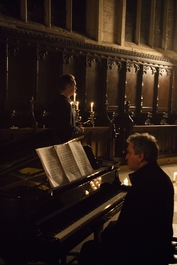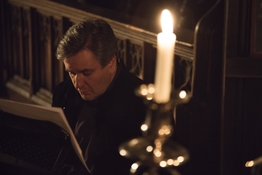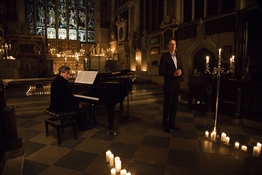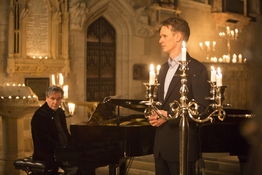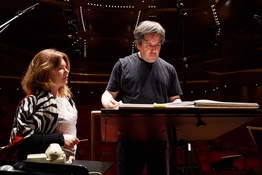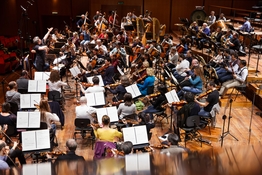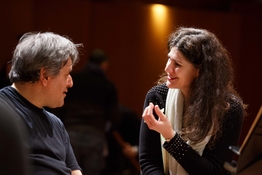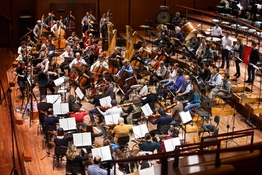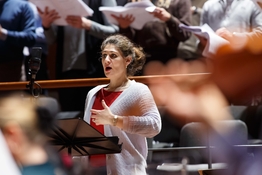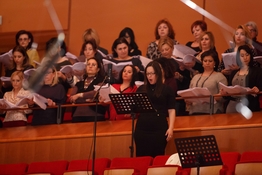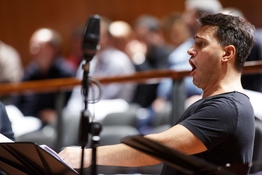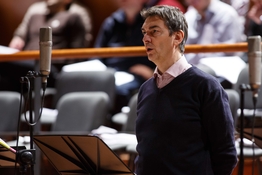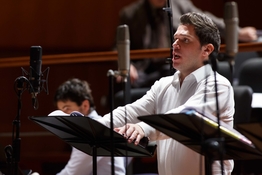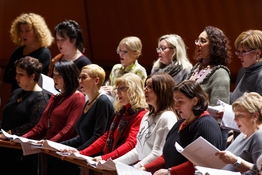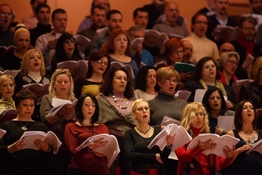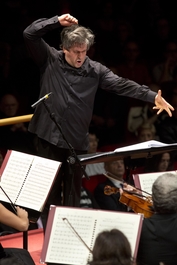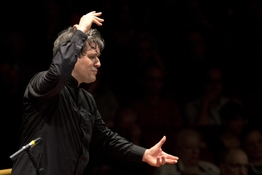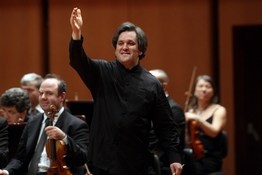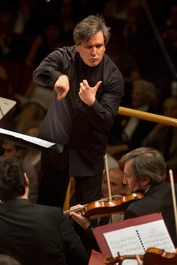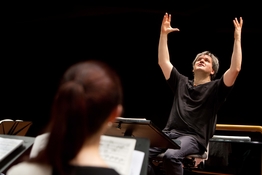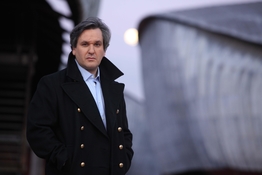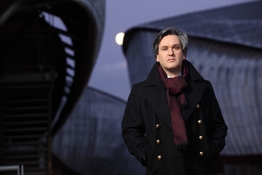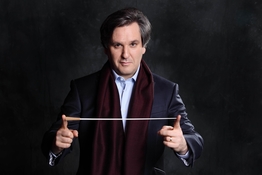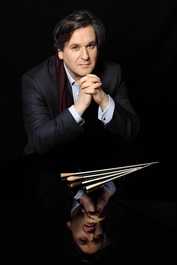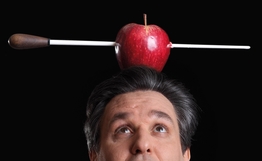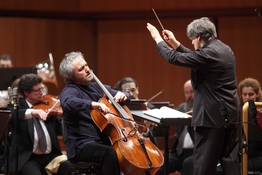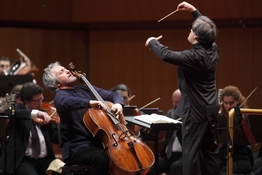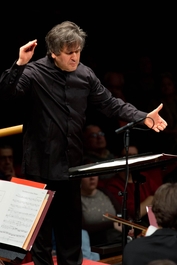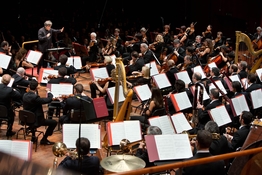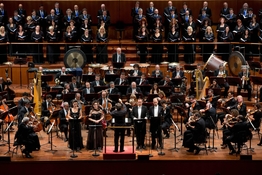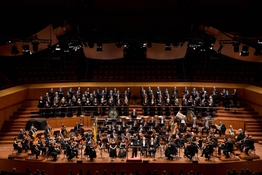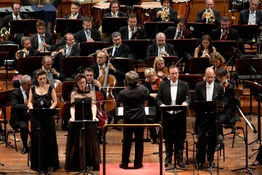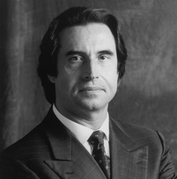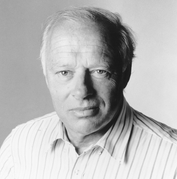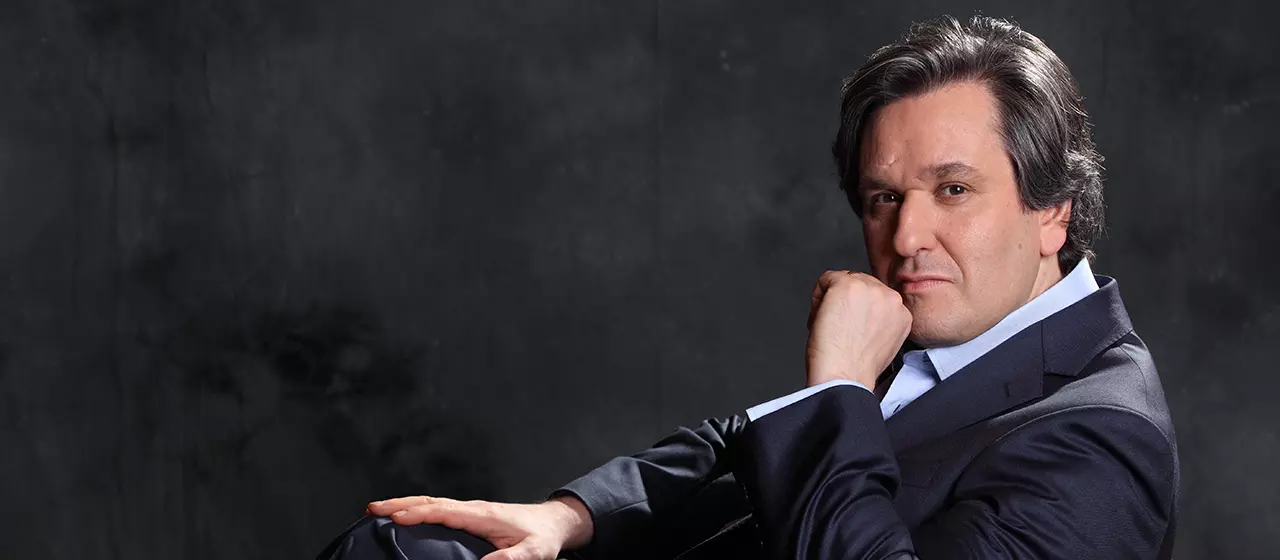

Antonio Pappano
News
Turandot
This recording of Turandot, Puccini’s spectacular final opera, marks a number of important firsts. Before the recording sessions in Rome in February and March 2022, Sir Antonio Pappano had never conducted Turandot – though he is a masterly interpreter of Puccini with La bohème, Tosca, Madama Butterfly, Il trittico and La rondine in his Warner Classics discography. Sondra Radvanovsky, the soprano in the soaring title role, and Jonas Kaufmann as her fearless suitor, Calaf – who, of course, sings ‘Nessun dorma’ – had not previously performed the opera. And while the catalogue contains a number of famous studio recordings of Turandot, none had included the entire, crucial final scene of the opera as completed after Puccini’s death in 1925 by the younger composer Franco Alfano.
The success of the entire project was confirmed by a public concert performance, greeted with a standing ovation, that took place at Rome’s Auditorium Parco della Musica a few days after recording had been completed: “Stunningly beautiful,” was the view of Opera magazine, “Pappano brings out the dramaturgical sense of every moment of the score, and this in turn served to confirm the wonderful rapport he has established with the forces of the Accademia Nazionale di Santa Cecilia … The singing was outstanding.” Il Corriere della Sera wrote that “First and foremost, this Turandot will be remembered as the highest-quality musical performance of recent years in Italy thanks to Antonio Pappano’s absolutely inspired achievement … It really felt like discovering a new Turandot.”
Antonio Pappano explains the story behind the Alfano completion, and the additional music that make this complete recording unique:
“Puccini’s health [the composer was suffering from throat cancer] and eventual death thwarted his ability to finish the final duet in which Calaf at last wins Turandot’s love. The scene was instead completed – or to be more accurate largely constructed (Puccini left only limited sketches at his death) – by Franco Alfano. Yet the conductor Arturo Toscanini [who conducted the premiere at La Scala, Milan in 1926] lodged loud complaints and had Alfano modify the structure and make a cut of over 100 bars.
“It is Toscanini’s ‘version’ that we hear most often today, but I managed to convince Sondra Radvanovsky and Jonas Kaufmann to accept the idea of recording Alfano’s original version, despite its stylistic flights of fancy. The melting of the ‘ice princess’ Turandot is somewhat more gradual and therefore better explained in this original version. I think Alfano had caught on to the more Germanic concept of opera characters undergoing a cleansing, by means of a psychological working-through of what has troubled them, so that they can be released from their demons. I was thrilled by how excited Sondra and Jonas were singing this! You have to have the very top singers here, as the writing is fearsome. I was very fortunate to have such an ideal cast for this opera, each character coming alive.”
Following the concert performance, Il Messaggero described Sondra Radvanovsky as “A magnificent Turandot, full of temperament … interpreting with great intensity,” and praised Jonas Kaufmann for bringing a prodigious palette of vocal colours and an abundance of emotion” to ‘Nessun dorma’. La Repubblica wrote that “Sondra Radvanovsky emerged triumphant. Imperious of expression, she projected brilliant notes over the orchestra, but was also capable of delicate, elegiac quiet singing of a kind that is rarely heard,” and that “As might be expected, Jonas Kaufmann displayed great vocal mastery, rising with assurance to every challenge of the role [of Calaf].”
The central couple were joined by the Albanian soprano Ermonela Jaho as the self-sacrificing slave girl Liù, who is desperately in love with Calaf and inspired some of Puccini’s most exquisite and touching music. “Ermonela Jaho was a wonderful Liù, with her distinctive dark timbre,” wrote Il Corriere della Sera, while Forum Opéra enthused over the “radiance and subtlety of Jaho’s quiet singing and her long-breathed phrasing in Liù’s arias …The fragile slave is perfectly suited to her hypersensitive temperament and vocal style.”
The cast also includes: bass Michele Pertusi as Calaf’s blind father, King Timur; Michael Spyres – a star tenor taking on the character role of Turandot’s father, the Emperor of China; Mattia Olivieri, Gregory Bonfatti and Siyabonga Maqungo as the court officials Ping, Pang and Pong, and the bronze-toned Michael Mofidian as the Mandarin whose grand proclamation opens the opera after its arresting, percussive orchestral introduction.
Summing up after the concert performance in Rome, Forum Opéra wrote: “Antonio Pappano’s interpretation will become a landmark … characterised by powerful contrasts and constant attention to the notes and their colours … A perfect sense of theatre … encouraging the cast to give of their absolute best.”
Rossini: Messa di Gloria
“Rossini’s Messa di Gloria is a mass of light,” says Sir Antonio Pappano. “It’s a Mass that praises the glory of God. It does not include either the Credo or the Crucifixus, with their darker elements, which would be heard in a full Mass. It was premiered in 1820 in a baroque church, San Ferdinando in Naples. When you listen to it, you can imagine the light of the church and the music fusing together beautifully.”
Pappano, as Music Director of Rome’s Chorus and Orchestra dell’Accademia Nazionale di Santa Cecilia, has built a notable discography of Rossini on Warner Classics: the epic opera Guillaume Tell, the Stabat Mater, the Petite Messe Solenelle and an album of operatic overtures. Now, with the Messa di Gloria, he expands it with the only liturgy-based work that Rossini wrote before his early retirement from composing opera, in 1829 when Guillaume Tell had been premiered in Paris and he was just 37 years old.
More rarely heard than the monumental Stabat Mater and the idiosyncratic Petite Messe Solenelle, the nine-movement Messa di Gloria requires five virtuosic vocal soloists. Here, three Italians – soprano Eleonora Buratto, mezzo-soprano Teresa Iervolino and bass Carlo Lepore – are joined by two Americans, Lawrence Brownlee and Michael Spyres, who celebrated Rossini and the star tenors of his era with their thrilling recital album Amici e Rivali, released in 2020. Spyres describes the Messa di Gloria as “some of the most difficult vocal writing Rossini ever penned. He really wanted to glorify the Church and the Word, showing the entire range of every single voice as he did so. It is truly bel canto at its height.”
Pappano is in agreement on the ambitions of the score: “Rossini makes high demands on his orchestra, but in the Messa di Gloria he gave the vocal soloists challenges that even by his standards were extreme – for agility and also colour. I was so lucky I had such a wonderful team of singers … The soloists need to sing with great spiritual fervour and also powerful confidence as they convey the fearlessness of Rossini’s relationship to God.
“This work is a tribute to virtuoso playing and singing, and also a celebration per se, praising God’s glory …With this treatment of the Latin text, the operatic virtuosity in the orchestra and the voices becomes something more than just pyrotechnics: it does and should bring a smile to the listener’s face … I don’t think Rossini was setting out to defy any perceived conventions of sacred music – he just composed this Messa in his natural way, connecting vividly to his audience in his inimitable fashion.
“Despite the speed with which he wrote it, and the obvious bel canto conventions in the singing, this Messa, like all his work, is always surprising ... All the way through there is such fertile inventiveness, and it is glorious to hear the way the Santa Cecilia Orchestra captures Rossini’s lightness. He is a composer who has become very important to me for his elegance, precision, wit, irony and panache … Unlike the Verdi Requiem or the Mozart Requiem, where the fear of God and the Day of Judgement is so intense, fear is not really present in Rossini’s Messa di Gloria. This is a beautiful quality to experience – Rossini is just open eyes, open face, and open arms to God.”
Antonio Pappano conducts the Orchestra dell'Accademia Nazionale di Santa Cecilia in Richard Strauss’s Burleske and Ein Heldenleben
Antonio Pappano conducts the Orchestra dell'Accademia Nazionale di Santa Cecilia in two works from the earlier phase of Richard Strauss’s career: a comparative rarity, the Burleske for piano and orchestra, with Bertrand Chamayou as soloist, and the epic tone poem Ein Heldenleben, one of the composer’s orchestral masterpieces. Composed when Strauss was in his early twenties, the Burleske carries echoes of Brahms, Schumann and Liszt. Ein Heldenleben, premiered in 1899 when Strauss was 34, shows him at the spectacular peak of his early maturity.
Strauss’s first great operatic success was to come with Salome (his third opera) in 1905, but as Pappano – Santa Cecilia’s Music Director since 2005 – points out: “Strauss always thought dramaturgically. When you are recording his music in Italy, the link has to be through opera, with all its theatricality, temperament, contrast and colour. I think the cantabile, singing quality of this Roman orchestra matters a great deal, because Strauss was such a great melodist: you need a certain charisma in the sound, which these players achieve. When you look at score like Ein Heldenleben you might think it seems almost impossibly complex, but Strauss was incredibly sure-footed in the way he used the orchestra. It’s highly virtuosic. When everyone knows exactly what they are doing, the orchestral machine is really a wonder to behold.
“Ein Heldenleben – A Hero’s Life – is a fascinating piece. It’s strongly autobiographical. You get the feeling that Strauss is presenting himself as the hero.” It is not by chance that the hero’s theme is presented in the key of E flat – also the key of Beethoven’s ‘Eroica’ Symphony. “The score paints a complete picture of a human being… There’s his home life with his wife Pauline, who as ‘The Hero’s Companion’ is characterised by a solo violin played by Roberto Gonzales Monjas. As we can hear, Pauline could be both temperamental and sentimental. You almost feel like you are a voyeur on their marriage with its tensions, conflicts and reconciliations. But the piece is also about a man striving to achieve extraordinary heights, about our hero going into battle as he is attacked by critics, portrayed by cackling woodwinds.” In the section ‘The Hero’s Works of Peace’, Strauss quotes from his own works, including the tone poems Don Juan, Tod und Verklärung, Till Eulenspiegel and Also Sprach Zarathustra. “It’s as if he’s reliving his life,” says Pappano, “so that in the end he can say goodbye with calm and resigned positivity.”
Two years before his death in 1949, Strauss conducted a concert for the last time, at London’s Royal Albert Hall. The Burleske, written nearly 50 years earlier, was on the programme. Bertrand Chamayou feels it shares the mercurial spirit of Schumann’s Carnaval and Humoreske, as its title might suggest. “There is a sense of surprise – even the way it is fashioned in a single movement: it’s not really a concerto, though it lasts 20 minutes, and you never quite know where it’s going. Not only does it have a sense of humour, it has a sense of the absurd.”
Strauss originally conceived the Burleske for the pianist Hans von Bülow, a pupil (and son-in-law) of Liszt, who in 1875 had given the premiere of Tchaikovsky’s Piano Concerto No 1. Von Bülow found the Burleske excessively challenging in technical terms and dismissively refused to learn it. It was eventually premiered by Eugen d’Albert, another Liszt pupil. “Von Bülow, who had small hands, said it was impossible because the hand position had to change in every bar,” elucidates Chamayou. “It actually sometimes changes two or three times in each bar – your hands need to be as agile as a cat! Maybe this is all contributes to the element of surprise. The way composers wrote for the piano in the 20th century has accustomed us to technical demands of this kind, but the Burleske is still challenging for a modern pianist.
“Mozart saw a concerto as a dialogue between soloist and orchestra, but by the time we reach Brahms it has become more like a sinfonia concertante.” (Like Brahms’s mighty Piano Concerto No 1, the Burleske is in D minor.) “There is something Lisztian about the spirit and form of the Burleske too. Perhaps it is best described as a kind a symphonic poem with a soloist who is quite a hysterical character – maybe even a little crazy!”
Beethoven Songs and Folksongs
At the heart of this programme of Beethoven songs performed by Ian Bostridge and Sir Antonio Pappano is the song cycle An die ferne Geliebte (To the distant beloved). It dates from 1816, the year that saw the publication of Beethoven’s 7th Symphony. Setting six poems by Alois Jeitteles, it is generally acknowledged to be the first example of a song cycle, a genre that became important in the 19th and 20th centuries. Beethoven creates a coherent whole, linking songs together with brief piano interludes and closing the circle by recalling material from the opening song in the final song.
“Somehow the most concentrated 13 or 14 minutes of music that Beethoven ever wrote,” is how Antonio Pappano describes An die ferne Geliebte. For Ian Bostridge, the cycle is an expression of Beethoven the romantic rather than the striving, heroic Beethoven we often perceive in the symphonies and concertos. “It’s a distillation of Beethoven as lover, but his beloved is far away and he can never reach her. The sadness of that is so poignant.” (Beethoven was notoriously unlucky in love.) It is through the manifestations of nature – and through his songs – that the lover in An die ferne Geliebte senses a connection with his beloved. Bostridge draws an analogy with the composer: “Beethoven puts his feelings into music on a piece of paper and sends it out to the world. It is rather like the dedication he made on the score of the Missa Solemnis.” After he had written that epic choral work, which came a few years after An die ferne Geliebte, Beethoven inscribed the score with the words: “Vom Herzen, möge es wieder, zu Herzen gehen!” – “From the heart: may it go in turn to the heart.”
Among the other songs on the album, the best known is the rapturously lyrical ‘Adelaide’, which dates from the mid-1790s. In a very different vein is a song to an Italian text, ‘In questa tomba oscura’ (1806-7), in which a dead man admonishes his faithless lover: “The textures of the piano reflect the darkness and bitterness of the text,” says Antonio Pappano. He also feels that Beethoven had an influence on the Italian opera: “I don’t think Donizetti, Bellini and Rossini would have been possible without Beethoven.”
Bostridge and Pappano are joined by violinist Vilde Frang and cellist Nicolas Altstaedt for eight of Beethoven’s charming settings (in English) of folksongs from the British Isles. Between 1809 and 1823, the composer arranged more than 160 song melodies at the request of his publisher in Edinburgh, George Thomson. “These arrangements were essentially commercial ventures,” explains Bostridge, “but Beethoven put some amazing music for piano trio into them.” Pappano concurs: “They’re real drawing-room music because they are for piano, voice, violin and cello. When we all play together, it’s like a family making music at home.”
2018 BBC Proms line-up revealed: Joyce DiDonato, Jean Rondeau and more!
The BBC Proms has revealed its 2018 programme, with several French classical stars making their Proms debut.
On 5 September, Joyce DiDonato reprises the role of Dido in highlights from Berlioz's Les Troyens, this time with John Eliot Gardiner and his Orchestre Révolutionnaire et Romantique. The American mezzo's recent recording with the Orchestre Philharmonique de Strasbourg and maestro John Nelson won the BBC Music Magazine Award for Best Opera Album earlier this month.
French coloratura soprano Sabine Devieilhe will take to the Royal Albert Hall stage for the first time on 26 July in Debussy's sensual cantata La Damoiselle élue, marking the centenary of the French composer's death. She sings Debussy on her latest album of French arias and songs, Mirages.
In another important French debut, Romantic pianist extraordinaire Bertrand Chamayou plays Mendelssohn's First Concerto on 20 July, with the BBC National Orchestra of Wales.
At Cadogan Hall, on 23 July, Jean Rondeau: another Frenchman in another Proms debut, this time an all-French harpsichord recital including music by Royer (from his album Vertigo), François Couperin and a world-premiere by Eve Risser.
Violinist Renaud Capuçon was in London recently for the launch of his Bartók concertos album with the London Symphony Orchestra. He returns 19 August with the Orchestre de la Suisse Romande as soloist in an orchestration of the Ravel Violin Sonata in G Major.
Soprano Diana Damrau sings her heartland repertory, songs by Richard Strauss, with the Royal Liverpool Philharmonic Orchestra and Vasily Petrenko.
A conductor very much familiar to London audiences, Sir Antonio Pappano, brings his Italian Orchestra dell'Accadamia Nazionale di Santa Cecilia to town for Bernstein's Symphony No.1 marking the centenary of the American composer's birth in August. Pappano has recorded the complete Bernstein Symphonies and The Age of Anxiety with the same orchestra and pianist Beatrice Rana for release later this year.
Discover the complete 2018 BBC Proms line-up here.
Krzysztof Penderecki, Ian Bostridge and Antonio Pappano among GRAMMY winners
Warner Classics has claimed two prizes at the 59th Grammy Awards ceremony, held last night at the Staples Center in Los Angeles and broadcast live on the CBS network.
British tenor Ian Bostridge, together with Sir Antonio Pappano at the piano, received the award for Best Classical Vocal Album for their critically acclaimed Shakespeare Songs, tying with Dorothea Röschmann and Mitsuko Uchida's Schumann. The wide-ranging recital explores four centuries of Shakespeare settings from William Byrd to Igor Stravinsky, marking the 400th anniversary of the Bard's death. The duo were joined by special guests Elizabeth Kenny on lute, flautist Adam Walker, violist Lawrence Power and clarinetist Michael Collins.
"It has been a great joy to rediscover the music in Shakespeare's incomparable texts and the music that has been written over the past four centuries to clothe them," said Bostridge. "Working again with Tony Pappano has been a particular pleasure."
The Best Choral Performance Grammy, meanwhile, went to the Warsaw Philharmonic orchestra and choir with composer-conductor Krzysztof Penderecki for the milestone recording Penderecki Conducts Penderecki. The album unites huge vocal and orchestral forces for the a collection of sacred music by Poland's greatest living composer, including the world premiere recording of his Dies Illa. The 83-year-old Penderecki has described the human voice as "the most difficult of instruments".
Three GRAMMY nominations for Warner Classics & Erato
The nominations for the 59th GRAMMY Awards have been announced, with three Warner Classics and Erato releases among the Classical albums to receive the nod.
A milestone release from Poland has been nominated in the Best Choral Performance category: the first volume in a series entitled Penderecki Conducts Penderecki, in which the legendary 82-year-old composer helms the Warsaw Philharmonic Orchestra and Choir and distinguished soloists in both new works (including the world premiere of his Dies illa) and iconic masterpieces.
French soprano Sabine Devieilhe's tribute to the women in Mozart's life, The Weber Sisters, is up for Best Classical Vocal Album.
In the same category is British tenor Ian Bostridge's new recital with Sir Antonio Pappano at the piano, Shakespeare Songs, exploring four centuries of Shakespearean poetry in song to mark the 400th anniversary of the Bard's death.
The GRAMMY winners will be announced on 12 February 2017 in a Los Angeles ceremony. See the complete list of nominees here.
Pappano's 'Aida' wins big in the prestigious German Record Critics' Awards
The German Record Critics' Association has awarded Sir Antonio Pappano's already-acclaimed Aida its annual prize for the most outstanding albums of the year across all genres.
"It's rare to hear such a flawless Triumphal March on disc," opined Opernwelt of this all-star studio recording from Rome featuring Anja Harteros in the title role, German tenor Jonas Kaufmann, Ludovic Tézier, Ekaterina Semenchuk and Erwin Schrott.
"This is a dynamically complex studio recording with outstanding qualities," wrote the Schallplattenkritik jury.
Pappano's Aida already took home Recording of the Year at the BBC Music Magazine and the French Diapason awards, Opera Recording of the Year in the Gramophone Awards, and The Times UK's Classical Album of the Year - just to name a few accolades.
Warner Classics wins Label of the Year at the 2016 Gramophone Awards
We are proud to announce that Warner Classics has been crowned Label of the Year at the prestigious Gramophone Awards in London. Now in its 39th edition, the Gramophone Awards are known as the ‘Oscars of classical music’. Warner Classics and its sister label Erato were also recipient of three category wins this year including the Opera , Recital, Concerto Awards. The Lifetime Achievement Award went to the legendary German singer Christa Ludwig, the favourite mezzo-soprano of Karajan, Böhm and Bernstein, for a career spanning over 45 years.
Label of the Year winner, Warner Classics, was represented by the label’s President, Alain Lanceron and Head of Classics UK, Patrick Lemanski, who collected the trophy from Gramophone’s Editor Martin Cullingford. In their citation, James Jolly and Martin Cullingford said: “Nurturing new artists, showing complete belief in them and giving them the devoted commitment they need to become tomorrow’s greats; honouring recording’s heritage with beautiful presentation and bringing it alive for a new generation; and continuing that golden tradition in our own day, with a no-expense-spared studio opera drawing on the talents of today’s leading artists: these are three facets of Warner Classics that come together to make them a worthy winner of our 2016 Label of the Year Award.”
Alain Lanceron accepted the award and commented: “Who would have thought in 2012, when the catalogues of EMI and Virgin were sold to Warner in an unstable climate, that four years later the label Warner Classics would receive the prestigious and coveted accolade of Gramophone Label of the Year? It is the proof that the guiding principles that led us to revive this label, with important new signings alongside deep catalogue exploitation, has borne fruit and that Warner Classics today holds a place in the hearts of classical music lovers all over the world. Thank you to Gramophone for this recognition and to all our artists and the Warner Classics team who make the label what it is today."
Patrick Lemanski, Head of Warner Classics UK, added: “I am absolutely delighted to celebrate together with all my UK Warner Classics team, the prestigious Label of the Year Award from Gramophone. It has been a fantastic year, ranging from ambitious frontline projects such as Pappano’s Aida to the magnificent legacy boxes honouring the talent of music icons like Yehudi Menuhin or Itzhak Perlman. I’m really pleased and proud to see all these efforts recognised and acknowledged by the fair judges at Gramophone magazine.”
Other big winners on the night included Sir Antonio Pappano for his studio recording of Verdi’s Aida (“Grand Opera doesn’t get grander than this,” opined the Gramophone critics). The Music Director of the Orchestra dell'Accademia Nazionale di Santa Cecilia accepted the award on stage: “I want to thank Stephen Johns (producer) and Jonathan Allen (engineer), and the vision of Alain Lanceron and his Warner Classics team. Thank you Alain for your continued believe in me and our Santa Cecilia Orchestra and in the power of Giuseppe Verdi who will always knock us dead, every time!”
Concerto category winner Vilde Frang played Tárrega’s Recuerdos de la Alhambra live in front of a captivated audience before accepting her award for the critically acclaimed Korngold and Britten album on Warner Classics (Frankfurt Radio Orchestra, James Gaffigan).
Conductor Raphaël Pichon accepted the Recital Award on behalf of his wife and artistic collaborator, French soprano Sabine Devieilhe, for their Mozart & the Weber Sisters album on Erato.
For the first time, the Gramophone Awards ceremony was streamed live by medici.tv, with parallel streams on classicfm.com and gramophone.co.uk. A celebratory Awards CD featuring full tracks from each of the winning recordings is available at Amazon.co.uk.
Gramophone Awards: Antonio Pappano, Vilde Frang & Sabine Devieilhe among winners
The winners of the 2016 Gramophone Classical Music Awards have been revealed, with Warner Classics and Erato recordings claiming prizes in three of the twelve categories.
The coveted Best Opera award this year goes to Warner Classics' widely acclaimed studio recording of Verdi's Aïda conducted in Rome by Sir Antonio Pappano, with an all-star cast (Anja Harteros, Jonas Kaufmann, Ludovic Tézier, Erwin Schrott, Ekaterina Semenchuk) and the Orchestra e Coro dell'Accademia di Santa Cecilia.
Gramophone praised the "orchestral playing of rare accomplishment from an Italian ensemble which is alive to the opera’s every word," while hailing soprano Anja Harteros "the most interesting Aida on record since Callas."
Norwegian star violinist Vilde Frang was up against stiff competition including Janine Jansen, Daniil Trifonov and Maria João Pires but came out on top for the Best Concerto Recording with her deeply personal, intense readings of Britten and Korngold Violin Concertos. The Gramophone critics were captivated by this "exciting player" and her "urgently communicative, potentially transformative accounts" of these two twentieth-century masterpieces.
"Playing with almost intimidating dexterity and polish, not to mention impeccable intonation (it comes as no surprise to discover that Anne-Sophie Mutter was an early mentor), her music-making still manages to project an impression of honesty and naturalness."
Young French soprano Sabine Devieilhe's star has well and truly risen with her second album for Erato, The Weber Sisters, which wins Best Recital exploring the arias Mozart wrote for three opera-singer sisters - his first love, his wife, and the first Queen of the Night. Devieilhe portrays these three 'characters' with effortless grace and thrilling highs.
"The programme centres around three magnificent showpiece arias for Aloysia, famed both for her expressive cantabile and her coloratura prowess," explained the Gramophone critic. "Among her specialities were sustained pianissimo high notes; and I can’t imagine they were more delicately floated than they are by Sabine Devieilhe, a lyric coloratura who combines a pure, sweet timbre and dazzling virtuosity."
Both Vilde Frang and Sir Antonio Pappano are in the running for the Artist of the Year award, which will be announced - along with the winners of Recording of the Year, Young Artist of the Year, Lifetime Achievement and Label of the Year - during the awards ceremony at London's St John's Smith Square on September 15 (streamed live by medici.tv).
Related releases

Antonio Pappano - Complete Symphonic, Concertante & Sacred Music Recordings

Rimsky-Korsakov: Scheherazade, Op. 35 / Mussorgsky: Night on Bald Mountain, “The Dream of Gric’ko”








Saint-Saëns: Organ Symphony and Carnival of the Animals



